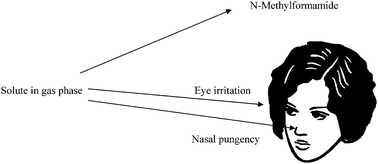Partition of compounds from water and from air into amides†
Abstract
Literature data on partitioning of compounds from the gas phase to a number of amides and from

* Corresponding authors
a
Department of Chemistry, University College London, 20 Gordon Street, London, UK
E-mail:
m.h.abraham@ucl.ac.uk
b
Department of Chemistry, University of North Texas, P. O. Box 305070, Denton, USA
E-mail:
bill.acree@unt.edu
c
Chemosensory Perception Laboratory, Department of Surgery (Otolaryngology), University of California, San Diego, La Jolla, USA
E-mail:
ecometto@ucsd.edu
Literature data on partitioning of compounds from the gas phase to a number of amides and from

 Please wait while we load your content...
Something went wrong. Try again?
Please wait while we load your content...
Something went wrong. Try again?
M. H. Abraham, W. E. Acree Jr and J. E. Cometto-Muñiz, New J. Chem., 2009, 33, 2034 DOI: 10.1039/B907118K
To request permission to reproduce material from this article, please go to the Copyright Clearance Center request page.
If you are an author contributing to an RSC publication, you do not need to request permission provided correct acknowledgement is given.
If you are the author of this article, you do not need to request permission to reproduce figures and diagrams provided correct acknowledgement is given. If you want to reproduce the whole article in a third-party publication (excluding your thesis/dissertation for which permission is not required) please go to the Copyright Clearance Center request page.
Read more about how to correctly acknowledge RSC content.
 Fetching data from CrossRef.
Fetching data from CrossRef.
This may take some time to load.
Loading related content
